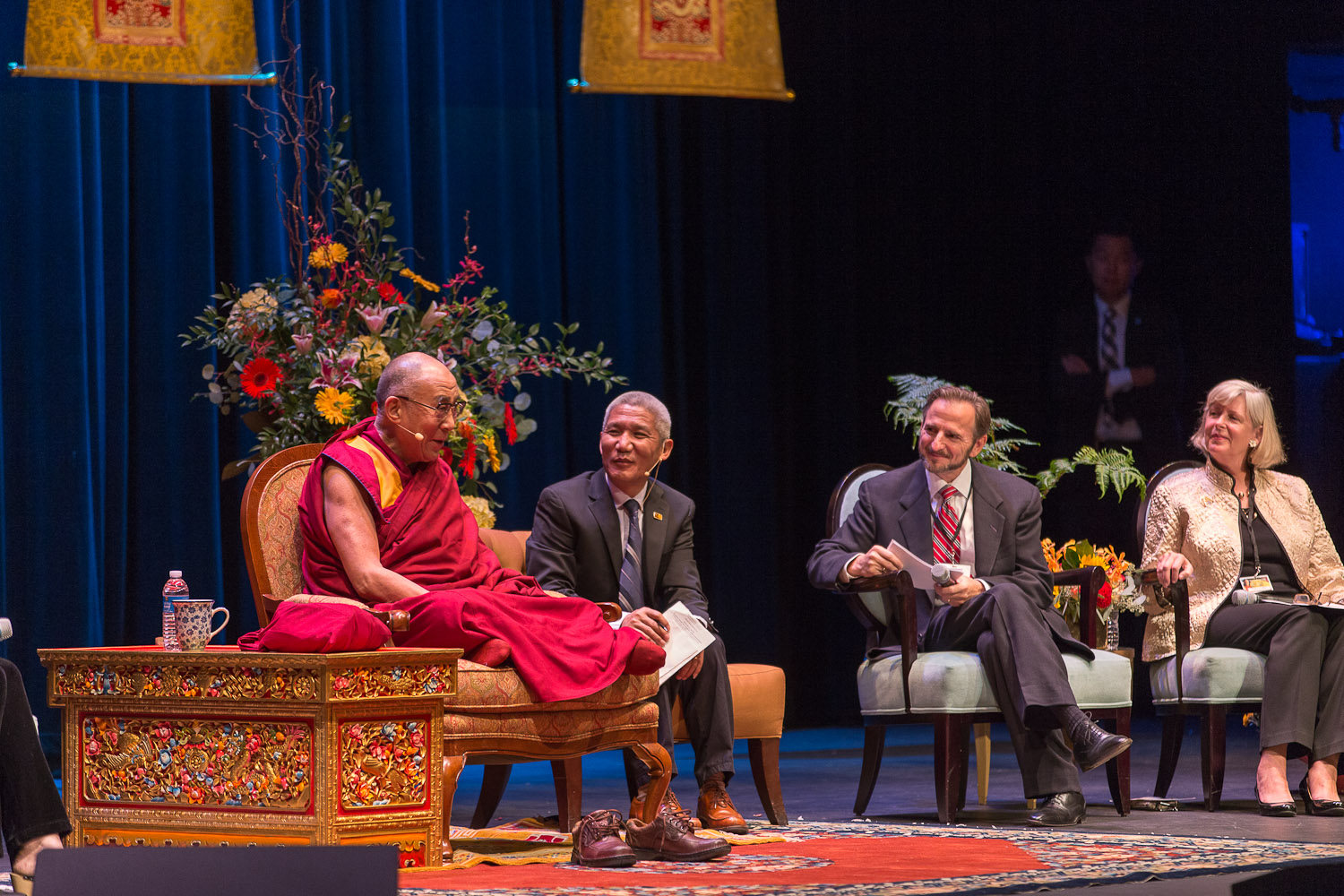The Dalai Lama joined five University of Virginia Health System clinicians on the Paramount Theater stage for nearly two hours today, the first of two events marking his Charlottesville visit.
The event was streamed live at the School of Nursing’s Fenwick Auditorium in McLeod Hall, where more than 125 people gathered to watch.
At times lighthearted and chuckling and at times kneading his creased forehead with worry, the 77-year-old Dalai Lama underlined his life lessons with a recurring theme: compassion as a remedy for what ails the world in general, and the American health care system in particular.
“Sometimes, the doctors and nurses carry on their work with duty,” said the Dalai Lama, who noted his own anxieties during his 2008 gall bladder surgery. “And sometimes you feel anxiety when they treat you like you’re their duty. But medicine won’t be effective if the heart is not good, if the heart isn’t compassionate.”
Flanking the Dalai Lama to his left and right were cardiologist Dr. George Beller; Dr. Leslie Blackhall, director of the Palliative Care Center; Dorrie Fontaine, dean of the School of Nursing; Dr. Richard Guerrant, director of the Center for Global Health; and Dr. James Nataro, who chairs the Department of Pediatrics.
The panel was moderated by former Charlottesville mayor Dave Brown. A translator sat to the Dalai Lama’s right.
Asked by Nataro about creating “mindfulness in a world that feels all our time must be killed, and all our needs must be filled,” the Dalai Lama replied that Asian and Western societies are increasingly similar as industrialization spreads and materialism flourishes.
“But we must not forget,” he said. “Same human beings, same potential.”
Throughout the talk, the Dalai Lama repeatedly underscored the link between emotional and physical health, and the idea that quieting the mind, and living with purpose and positivity, makes for a stronger, healthier, happier life.
“Inner resources,” he said from the chair where he sat cross-legged and shoeless, a red visor tipped on his bald head, right arm bare and gesturing from beneath a maroon robe. “Inner values.”
The Dalai Lama praised Fontaine after hearing her description of “the pause” – a 45-second moment of silence, meditation and recognition, which is done routinely when a patient dies in the Medical Center’s Emergency Room and is part of the School of Nursing’s Compassionate Care and Empathic Leadership Initiative.
He noted that the practice is akin to ancient Buddhist traditions. “So wonderful,” he said. “When you turn your thoughts from a very distressing (emotion) – anger, some very negative things – it can shift to others.”
Then he demonstrated what he does to soothe himself. Covering a single nostril, he breathed five purposeful breaths, then covered the other nostril and did the same thing.
“We do that usually two times, and then breathe through the nose,” he explained. “Then your mind shifts and fully concentrates on the breathing. You settle down.”
The Dalai Lama even addressed human beings’ fear of death, prompted by a question from Blackhall.
“A person’s mental attitude is part of their existence,” he said. “We all feel some form of permanence. But even the words – cancer, death – these very words frighten and disturb.”
The solution, he said, is both accepting that death will come, and understanding that the concept of life after life, whether it’s heaven or hell, or reincarnation, provides comfort. Even in the last moments of life, he said, it’s imperative to be positive.
“In that last moment of life, the mind is very important,” he said. “A peaceful death is good, and at least the family members can feel less sad. If you are at that last moment positive, then your next life will be almost surely a good life.
“The dying person, give them peace, and hope. Let them reflect on these things, so they say, ‘I am satisfied. I can leave happy.’”
Beller cited studies asserting that the number of patients receiving compassionate care is decreasing. He also noted the distraction introduced with the advent of the electronic medical records, which widens the gap between the patient and the health care provider as computers become the point of focus.
Again, the Dalai Lama offered praise.
“I listen to the ways in which you all are thinking about the problems, and it’s remarkable,” said the Dalai Lama, urging the panel of health care providers, professors and administrators to continue their work to address these “gaps in the system.”
The Tibetan spiritual leader also reminded the panel and the audience that problems are much more acute in other parts of the world. America, he said, must lead the way in innovating compassionate care because “people love to copy America.”
“The whole world has many unnecessary problems,” the Dalai Lama said. “Not only are we cheating human beings, we’re also cheating God.”
We must return to core principles, he said, of honesty and truth, and concern and compassion in our day-to-day lives, which are “very much littered with these things.”
“There is no room for jealousy, suspicion, anger, stress,” he said. “We must create inner peace, self-confidence, inner strength. And that’s very good for health, for healthy families and healthy societies and communities. That’s my view.”
The Dalai Lama – born Tenzin Gyato, the 14th Dalai Lama of Tibet – is the spiritual leader of Tibetan Buddhism, a Nobel Peace laureate and author of “My Spiritual Journal” and “Beyond Religion: Ethics for a Whole World.”
Media Contact
Article Information
October 11, 2012
/content/dalai-lama-exchanges-ideas-laughter-health-system-clinicians

